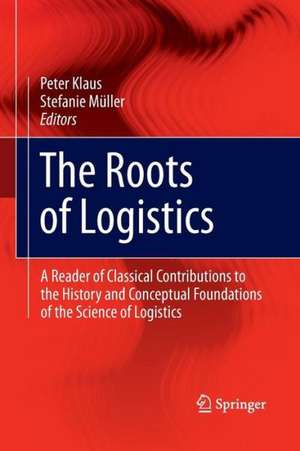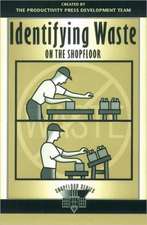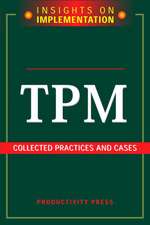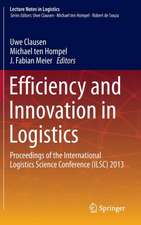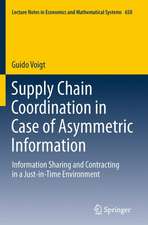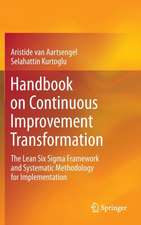The Roots of Logistics: A Reader of Classical Contributions to the History and Conceptual Foundations of the Science of Logistics
Editat de Peter Klaus, Stefanie Mülleren Limba Engleză Paperback – 10 iun 2014
This volume aims to contribute to this debate in two ways:
It offers a selection of “classical”, in some cases hard to access original international contributions to the evolution of the field in one convenient volume of readings. As such, it should be useful to students of the field, to researchers, and to practitioners who are interested in tracing the logistical ideas and instruments they are using down to their conceptual “roots”.
Beyond that, by the arrangement and commentaries to the original materials, the editors are proposing their own innovative interpretation of the evolution and identity of the “Science of Logistics”. It is an invitation to further debate the potential and future of logistics.
| Toate formatele și edițiile | Preț | Express |
|---|---|---|
| Paperback (1) | 1048.05 lei 38-44 zile | |
| Springer Berlin, Heidelberg – 10 iun 2014 | 1048.05 lei 38-44 zile | |
| Hardback (1) | 1228.29 lei 6-8 săpt. | |
| Springer Berlin, Heidelberg – 9 mai 2012 | 1228.29 lei 6-8 săpt. |
Preț: 1048.05 lei
Preț vechi: 1379.01 lei
-24% Nou
Puncte Express: 1572
Preț estimativ în valută:
200.61€ • 217.98$ • 168.62£
200.61€ • 217.98$ • 168.62£
Carte tipărită la comandă
Livrare economică 17-23 aprilie
Preluare comenzi: 021 569.72.76
Specificații
ISBN-13: 9783642439186
ISBN-10: 3642439187
Pagini: 440
Ilustrații: X, 430 p.
Dimensiuni: 155 x 235 x 23 mm
Greutate: 0.61 kg
Ediția:2012
Editura: Springer Berlin, Heidelberg
Colecția Springer
Locul publicării:Berlin, Heidelberg, Germany
ISBN-10: 3642439187
Pagini: 440
Ilustrații: X, 430 p.
Dimensiuni: 155 x 235 x 23 mm
Greutate: 0.61 kg
Ediția:2012
Editura: Springer Berlin, Heidelberg
Colecția Springer
Locul publicării:Berlin, Heidelberg, Germany
Public țintă
ResearchCuprins
The „roots' of logistics: Physical distribution and traffic management.-How logistics understanding evolved.- Definitions changing during four decades.- Attempts to concretize logistics as a science and to establish a theoretical framework.- Instruments, practices, and methodologies of logistics.
Recenzii
From the book reviews:
“As an Operations Researcher … I welcomed the opportunity to dig up the roots of this discipline, to understand its history and how various disciplines contributed to it. … The editors of the Roots of Logistics, through casting their net very wide in researching the history of this important discipline, were indeed, able to offer ‘A Reader of Classical Contributions to the History and Conceptual Foundations of the Science of Logistics.’” (Hans Ittmann, IFORS Newsletter, Vol. 8 (4), December, 2014)
“As an Operations Researcher … I welcomed the opportunity to dig up the roots of this discipline, to understand its history and how various disciplines contributed to it. … The editors of the Roots of Logistics, through casting their net very wide in researching the history of this important discipline, were indeed, able to offer ‘A Reader of Classical Contributions to the History and Conceptual Foundations of the Science of Logistics.’” (Hans Ittmann, IFORS Newsletter, Vol. 8 (4), December, 2014)
Notă biografică
Prof. (em.) Peter Klaus, D.B.A./Boston Univ., held the chair of Business Logistics at Friedrich-Alexander-University Erlangen-Nuernberg, Germany, for nearly 20 years. He started his career in the transport industry, spent time in the United States, and headed up the Fraunhofer Center for Technologies in the Logistics Service Industries (ATL) at Nuernberg. He is Editor-in-Chief of “Logistics Research”, an academic journal published by Springer.
Prof. Dr. Stefanie Müller holds the chair of Logistics and Transport Management at Georg-Simon-Ohm University of Applied Sciences, Nuremberg. Besides, she cooperates with logistics service providers offering advice in costing, performance measurement, and process management. Prior to her academic career, Stefanie Müller worked for a global fowarding company for more than 15 years, dealing with operations management, network planning, sales, customer service, and other functions.
Prof. Dr. Stefanie Müller holds the chair of Logistics and Transport Management at Georg-Simon-Ohm University of Applied Sciences, Nuremberg. Besides, she cooperates with logistics service providers offering advice in costing, performance measurement, and process management. Prior to her academic career, Stefanie Müller worked for a global fowarding company for more than 15 years, dealing with operations management, network planning, sales, customer service, and other functions.
Textul de pe ultima copertă
Is Logistics a science? – The importance and impact of logistics as a function which is critical to the success of companies, of entire industries, and even of nations competing in the global economy, is no longer questioned today. Logistics, within a few decades, has established itself firmly as a profession, an important field of sophisticated managerial practices, and as a large, powerful industry. But in the academic world the question of its status and identity as a science is still being debated.
This volume aims to contribute to this debate in two ways:
It offers a selection of “classical”, in some cases hard to access original international contributions to the evolution of the field in one convenient volume of readings. As such, it should be useful to students of the field, to researchers, and to practitioners who are interested in tracing the logistical ideas and instruments they are using down to their conceptual “roots”.
Beyond that, by the arrangement and commentaries to the original materials, the editors are proposing their own innovative interpretation of the evolution and identity of the “Science of Logistics”. It is an invitation to further debate the potential and future of logistics.
This volume aims to contribute to this debate in two ways:
It offers a selection of “classical”, in some cases hard to access original international contributions to the evolution of the field in one convenient volume of readings. As such, it should be useful to students of the field, to researchers, and to practitioners who are interested in tracing the logistical ideas and instruments they are using down to their conceptual “roots”.
Beyond that, by the arrangement and commentaries to the original materials, the editors are proposing their own innovative interpretation of the evolution and identity of the “Science of Logistics”. It is an invitation to further debate the potential and future of logistics.
Caracteristici
Compiles key articles that would cause much effort to gather and bring together
Arranges and evaluates these articles regarding their influence
Draws a "roadmap" of modern logistics, depicting a modern discipline of considerable importance
Includes supplementary material: sn.pub/extras
Arranges and evaluates these articles regarding their influence
Draws a "roadmap" of modern logistics, depicting a modern discipline of considerable importance
Includes supplementary material: sn.pub/extras
Descriere
with contributions by numerous experts
